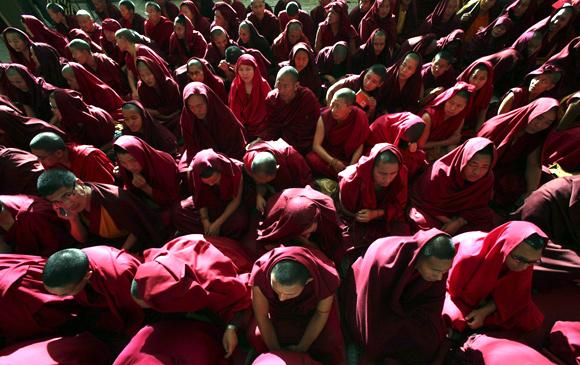
The death of 26-year-old Jampel Yeshi, who immolated himself in New Delhi last week, makes it clear, says Claude Arpi, that the regime in Beijing has utterly failed to extinguish the Tibetan fire for freedom.
Jampel Yeshi has become 'Pawo' Jampel Yeshi, the hero.
The 26-year-old Tibetan youngster who immolated himself on March 26 in New Delhi during a demonstration against Chinese President Hu Jintao's presence at the BRICS Summit, was given a 'national' funeral in Dharamsala, the seat of the Central Tibetan Administration of the Dalai Lama.
The picture of the young native of Tawu from the Kham province of eastern Tibet was splashed on the front pages of hundreds of publications around the world.
After Yeshi had set himself aflame, he ran several metres in front of journalists and policemen at Jantar Mantar.
With 98 per cent burn injuries, he survived for a day, raising hope among his supporters; unfortunately, he passed away a day later.
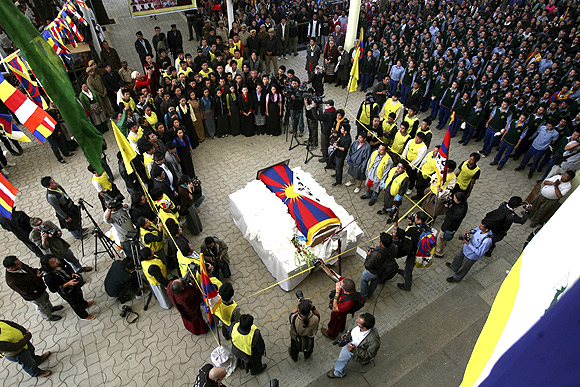
Jamphel Yeshi had escaped to India in 2006 and, like most newly-arrived refugees, he learnt English at the Tibetan Transit School near Dharamsala.
After three and a half years, he left the Himalayan resort to settle in Delhi, where he often participated in activities linked to the Tibetan struggle.
Yeshi was the first Tibetan to immolate himself in exile after many years (in 1998, Thubten Ngodup had immolated himself in New Delhi).
This immolation follows 32 others in Tibet since March 2011.
As khatas (Tibetan ceremonial scarves) were placed on Yeshi's coffin near the Central Cathedral in Dharamsala, with the Tibetan national anthem resounding in the hill town over the Kangra Valley, two Tibetan monks set themselves on fire in Barkham (Ngaba Tibetan Autonomous Prefecture of Sichuan province).
According to the Tibetan Centre for Human Rights and Democracy: 'Tenpa Dhargyal and Chime Palden are monks at Gyalrong Tsodun Kirti Monastery in Barkham county. The monks set themselves on fire while shouting slogans against the Chinese government.
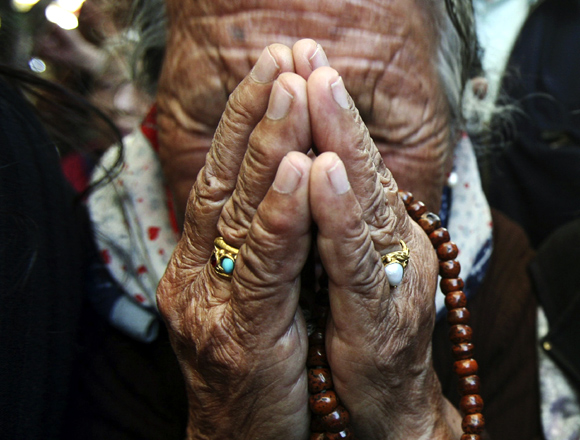
During the last few months, this regular and tragic practice has shaken a Chinese leadership that is in transition and is itself caught up in a rarely-so-open power struggle at the helm.
During the Dharamsala function, Dhondup Lhadar, vice president of the Tibetan Youth Congress which spearheaded the demonstration against President Hu in Delhi, spoke emotionally of the young martyr's last days.
Jamphel Yeshi had dropped some hints that he was planning something 'special'. He had spoken to a friend about the happenings in Tibet. He had given his brother a suitcase full of his clothes and told him he had transferred his money to the former's bank account.
He justified this by explaining, 'I'd like to join the protest organised by the Tibetan Youth Congress, and maybe I won't be coming back.'
It is only after his death that his 'testament' was found at the bottom of the suitcase.
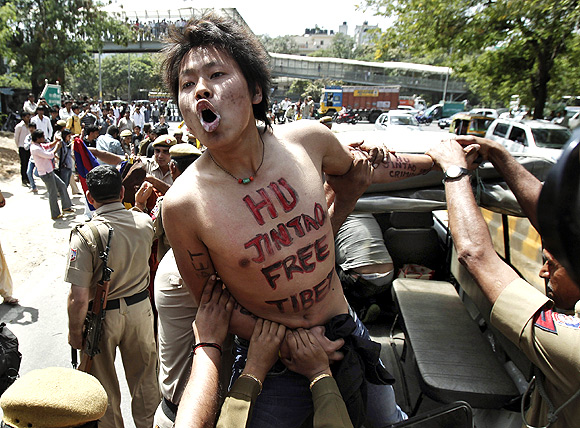
When one sees Yeshi's note, what is most surprising is how neatly it has been written (in Tibetan). I am not a graphologist, but I was struck by the orderly, regular, smoothly-shaped script. How can someone who was planning to sacrifice his own life be so calm and composed?
His arguments, clearly, had been made after deep thought.
Yeshi first pays homage to the Dalai Lama: 'Long Live His Holiness the Dalai Lama, who is the shining example of world peace. We must strive to ensure the return of His Holiness to Tibet. I pray and believe that the Tibetan people in and outside Tibet will be united and sing the Tibetan national anthem in front of the Potala Palace.'
Then he addresses his 'fellow Tibetans': 'When we think about our future happiness and path, we need loyalty. It is the life-soul of a people. It is the spirit to find truth. It is the guide leading to happiness.
'My fellow Tibetans, if you want equality and happiness as the rest of the world, you must hold onto this word 'LOYALTY' towards your country. Loyalty is the wisdom to know truth from falsehood. You must work hard in all your endeavours, big or small.'
Yeshi exhorts them to remain united: 'My fellow Tibetans from Three Provinces, it is clear to us all that if we unitedly put our strength together, there will be results. So don't be disheartened.'
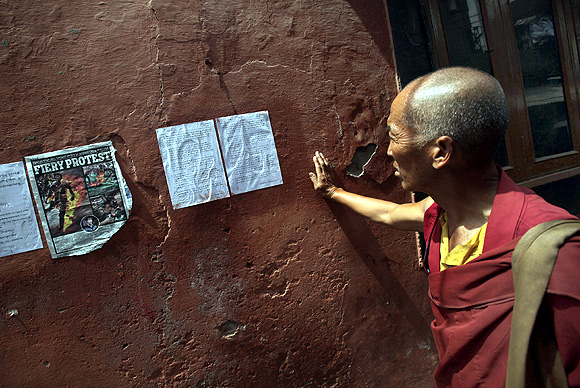
He then speaks about this special moment in the history of his nation: 'At a time when we are making our final move toward our goal -- if you have money, it is the time to spend it; if you are educated it is the time to produce results; if you have control over your life, I think the day has come to sacrifice your life.
'The fact is that Tibetan people are setting themselves on fire in this 21st century to let the world know about their suffering, and to tell the world about the denial of basic human rights. If you have any empathy, stand up for the Tibetan people.'
His demands are simple – 'freedom to practice our religion and culture, freedom to use our language -- the same right as other people living elsewhere in the world.'
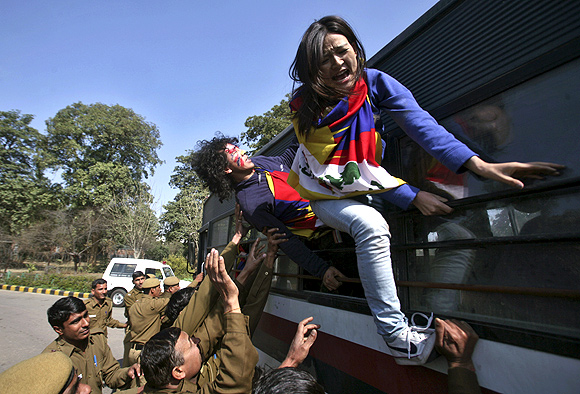
There is no doubt that we are witnessing a turning point in the Tibetan movement.
Till last year, the Dalai Lama was involved in the daily political decisions. He has since then 'retired' and does not actively participate in the political life of the exiles.
One example: He has hardly commented on the self-immolations and, though Yeshi's funeral was less than a furlong away from his residence, he did not participate.
The Chinese leadership probably regrets today that serious negotiations were not started with the Tibetan leader; since the immolation movement started, the Tibetan struggle has taken a new, much more radical, turn. Who remembers the Middle Path today?
Further, the immolations have got as much coverage as the Dalai Lama's high-profile political encounters with world leaders. The Chinese were probably not expecting this sudden visibility.
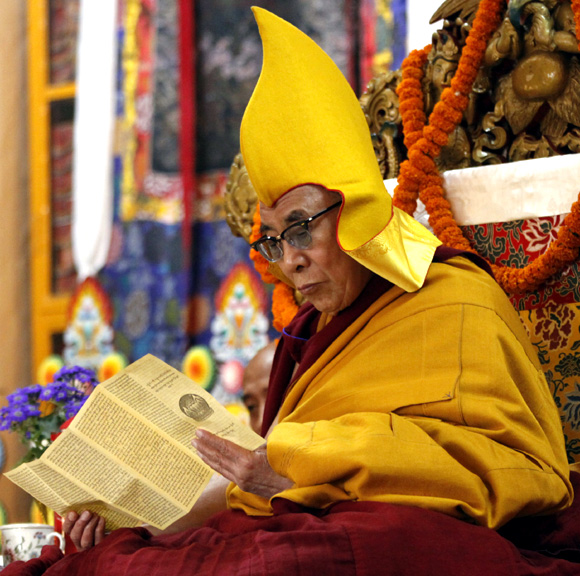
A Tibetan who has occupied important positions in Dharamsala and lived the last 53 years in exile, wrote to me after Yeshi's funeral: 'I have just come from the funeral ceremony of Jampel Yeshi. It was moving and charged with emotion. I have never felt like this before.
'As some of the speakers said, it was both a sad and a proud occasion. I am amazed at the courage and determination of these young Tibetans who sacrificed their lives for Tibet.
'I neither have the courage nor the determination. These brave acts are extremely inspiring. I have always felt so, even of those who have been imprisoned and tortured -- and in some ways it was probably more difficult.
'These desperate acts clearly show that the Tibetan spirit is still strong. But the frightening fact is that we are up against such a formidable foe who everyone, including the most powerful nation on earth, is scared of.'
What he wrote is a clear picture of the present situation. Since the beginning of the Dragon Year, the regime in Beijing has never been so febrile -- the clearest sign of this is the wave of diverse wild rumours emanating from Beijing.
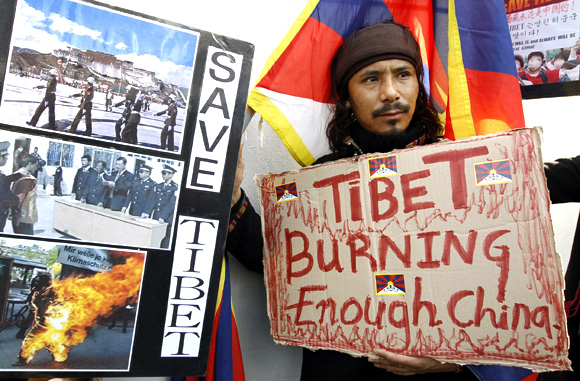
Can the Tibetan David make the Communist Goliath wobble further?
There are indeed reasons for Beijing to be anxious.
If one looks at the profiles of those who did the supreme sacrifice for Tibet, one discovers how young some of these monks or nuns were; for example, Tenzin Choeden, who immolated herself on February 11, was a 18-year old nun of Ngaba.
These new 'protestors' have not witnessed the Tibetan uprising of 1959, the Martial Law in Tibet in 1988-89, the Tiananmen Square events a few months later or the riots of the early 1990s.
It means that the regime in Beijing has utterly failed to extinguish the Tibetan fire for freedom.
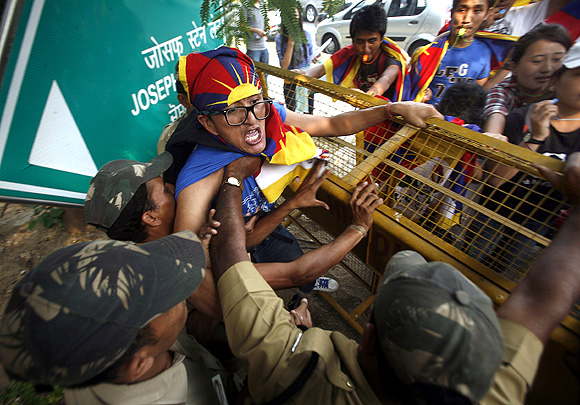
During the funeral of the new 'Pawo', the speaker of the Tibetan assembly, Penpa Tsering, asked: 'Now, the question is how many more Tibetan lives will be lost before the Tibetan issue is resolved?'
We will probably witness many more self-immolations; there is no doubt that it gives the younger generation a chance to dream of a better world.
In a sense, this movement marks the failure of the Dalai Lama's Middle Path policy and Beijing's rejection of the Tibetan leader's moderate demands.
One can only hope that a more reasonable leadership -- one that will see the advantages of a fair negotiated settlement -- will emerge during the 18th CCP Congress to be held later this year in Beijing.